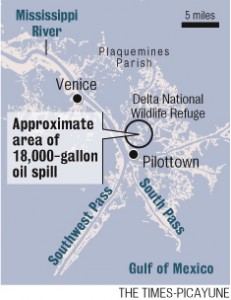http://sentinelsource.com/articles/2010/04/09/opinion/sentinel_editorial/free/id_397024.txt
The Sentinel SENTINEL EDITORIAL:
Obama’s reversal on offshore drilling
Published: Friday, April 09, 2010
When he was a candidate for president, Barack Obama firmly opposed offshore oil drilling, especially in Florida. “When I’m president, I intend to keep in place the moratorium here in Florida and around the country that prevents oil companies from drilling off Florida’s coasts,” he said during a 2008 campaign stop in Jacksonville.
By way of contrast, Republican John McCain backed President George W. Bush’s effort to end the moratorium that Obama mentioned – a congressional ban on offshore drilling, except in the central and western Gulf of Mexico, that had been in effect since 1982. Energy experts contended that benefits from expanded drilling would be long in coming, threaten the environment and provide at best a few years’ petroleum supply at great cost.
Obama said he wanted instead to develop alternative fuels, invest in clean energy options and encourage fuel-efficient vehicles – to ease and extend the transition to the day when either ruinous expenses or environmental hazards turn off the oil spigot.
As president, Obama has taken some steps in that direction, including a just-released plan to dramatically increase automobile mileage standards. But his administration has now announced a plan to allow oil and gas drilling along the Atlantic coastline from Delaware to mid-Florida, and to extend exploration to parts of the Florida Gulf Coast and to the Arctic Ocean north of Alaska.
This about-face on drilling mirrors the president’s recent change of position on nuclear power. During the presidential campaign, he said he was not opposed to expanding nuclear energy, but he said he would first see to it that safety concerns were addressed. In an interview at The Sentinel in late 2007, he said: “Given the importance of reducing carbon emissions, nuclear should be in the mix – if we can make it safe, we know how to store (the nuclear waste and) we can make sure that it’s not vulnerable to terrorist attack.” For emphasis, he added that the safety issues plaguing nuclear energy “may not be solvable. And if they are not solvable, then I don’t want to invest in it.”
Now, in another 2010 initiative, he has proposed making available $50 billion in federal loan guarantees for private industry to build new nuclear power plants. And with nary a word about waste storage or terrorist attacks.
These policy reversals seem to be part of an Obama effort to attract Republican advocates of oil drilling and nuclear power to his climate-change and energy-efficiency legislation. “The Republicans and the oil companies have been really beating the drums on drilling,” he said in a recent interview, “and so we don’t want gridlock. We want to get something done.”
But should that “something” include activities he and his supporters once deemed both reckless and insufficient? If oil drilling off the American coastline was a bad idea two years ago, has anything changed in the interim? If nuclear waste disposal and the potential for terrorist attacks on storage facilities were impediments to the expansion of nuclear power two years ago, has anything happened since then to make those risks acceptable?
During the summer of 2008, Obama charged that McCain’s advocacy of offshore drilling was no more than an empty political maneuver, “a strategy designed to get politicians through an election.” Now, as president, Obama is promoting policies on oil drilling and nuclear power designed to get other legislation through Congress. Given the stakes involved, is that strategy any more responsible?
